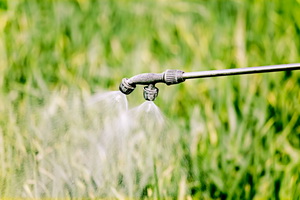
Herbicide Use Increased More for Non-GM Crops than Biotech Crops, Study
April 19, 2017| |
 University of Wyoming (UW) scientist reports that herbicide use has increased more rapidly over the last 25 years in non-GE crops than in GE crops. The findings are published in Nature Communications.
University of Wyoming (UW) scientist reports that herbicide use has increased more rapidly over the last 25 years in non-GE crops than in GE crops. The findings are published in Nature Communications.
Herbicide use in farming GE crops has been a long time issue for biotech critics claiming that GE crop adoption increases herbicide usage. However, Andrew Kniss of the Department of Plant Sciences in UW showed that herbicide use intensity increased over the last 25 years in maize, cotton, rice, and wheat. Even if GM crops were perceived to cause an increase in herbicide use, the actual increases in herbicide use were faster in non-GM crops.
The results showed that even as herbicide use increased, chronic toxicity associated with herbicide use decreased in two out of six crops, while acute toxicity decreased in four out of six crops. In the last year of the study, glyphosate accounted for 26% of maize, 43% of soybean and 45% of cotton herbicide applications. However, due to the relatively low chronic toxicity of this particular herbicide, it contributed only 0.1, 0.3 and 3.5% of the chronic toxicity hazard in those crops, respectively.
If weeds are uncontrolled by herbicides, the global food production could decrease by 20-40%.
For more details, read the research article in Nature Communications.
| |
Biotech Updates is a weekly newsletter of ISAAA, a not-for-profit organization. It is distributed for free to over 22,000 subscribers worldwide to inform them about the key developments in biosciences, especially in biotechnology. Your support will help us in our mission to feed the world with knowledge. You can help by donating as little as $10.
-
See more articles:
-
News from Around the World
- Almost Two Billion People in the World Depend on Imported Food
- Herbicide Use Increased More for Non-GM Crops than Biotech Crops, Study
- Farms in Kenya Face Armyworms Attack
- Abscisic Acid Role in Plant Branching
- U.S. EPA Implements Temporary Exemption from the Requirement of a Tolerance for mCry51Aa2
- UC Davis Scientists Report that Plant Genes Have Volume Controls
- Lettuce Genome Assembly Published
- Twitter Survey Shows 71% of Votes Say GMOs Needed to Feed World Population
- Indonesian Farmers to Gain Access to Paddy Seeds Resistant to Hoppers and Bacterial Blights
-
Research Highlights
- ES7 Functions in Nitrogen Metabolism and Chlorophyll Synthesis in Rice
- Traditional Breeding Alters Maize Composition More than Stacking Transgenic Events
-
Beyond Crop Biotech
- Genetic Modification of Escherichia coli for Propionate Production
-
Announcements
- International Food Conference on Global Food Security
-
Plant
- The Use of Viral Vectors for Plant Genome Editing
- Tobacco Enzymes Inactivated via Multiplex CRISPR-Cas9 Strategy
-
Read the latest: - Biotech Updates (October 22, 2025)
- Gene Editing Supplement (September 24, 2025)
- Gene Drive Supplement (February 22, 2023)
-
Subscribe to BU: - Share
- Tweet
